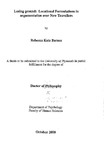Losing ground : locational formulations in argumentation over New Travellers
| dc.contributor.author | Barnes, Rebecca Kate | |
| dc.contributor.other | Faculty of Science and Engineering | en_US |
| dc.date.accessioned | 2011-05-11T09:41:41Z | |
| dc.date.available | 2011-05-11T09:41:41Z | |
| dc.date.issued | 2000 | |
| dc.identifier | not available | en_US |
| dc.identifier.uri | http://hdl.handle.net/10026.1/366 | |
| dc.description.abstract |
This thesis is an exercise in discursive psychology. The body of discourse analysed concerns the defence of rural space against New Travellers. In contrast to previous sociological and human geographical work in this area, instead of newspaper articles and Parliamentary discourse, participants' talk and texts are the starting point for the - investigation. The data corpora have been generated from a variety of sources: Focus group discussions with police officers; interviews with landowners (or their representatives); letters to the editors of local newspapers; and private letters of complaint to a local council. The thesis focuses on the participants' selection of locational formulations, the work this has taken, and how this work partly constitutes interactional business. The thesis makes a distinctive contribution to several different areas. This includes offering a disciplinary critique of how humanist geographers and environmental psychologists have constructed attachment to place as the norm, whilst problematising high residential mobility. Without taking up a position in this debate the thesis demonstrates how a discursive approach an offer a different perspective on place discourse- including the way that place identity / attachment might be reconceived and studied. The first two analytic chapters provide a distinctive contribution to discursive psychology by bringing together, and building on, previous work around the analysis of Abstract place discourse. Chapter five demonstrates participants' use of location as a domain of warrant for making complaints about New Travellers. Chapter six demonstrates how participants used spatial descriptions to construct New Travellers as transgressive or literally 'out-of-place'. The third and final analytic chapter, chapter seven provides a contribution to social psychology by demonstrating citizenship in practice. The project concludes by considering these contributions and their implications, and outlining several reasons for further work on the discursive psychology of place. The thorny issues raised by a focus on place, such as realism vs relativism are also discussed. | en_US |
| dc.description.sponsorship | the Department of Psychology, University of Plymouth | en_US |
| dc.language.iso | en | en_US |
| dc.publisher | University of Plymouth | en_US |
| dc.subject | Rural space | |
| dc.subject | Rural space, defence of | |
| dc.subject | Geography | |
| dc.subject | Psychology | |
| dc.subject | Travellers | |
| dc.subject | Realism vs relativism | |
| dc.subject | Attachment to place | |
| dc.subject | Discursive psychology | en_US |
| dc.title | Losing ground : locational formulations in argumentation over New Travellers | en_US |
| dc.type | Thesis | en_US |
| dc.identifier.doi | http://dx.doi.org/10.24382/1395 |
Files in this item
This item appears in the following Collection(s)
-
01 Research Theses Main Collection
Research Theses Main


